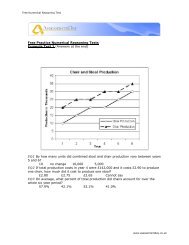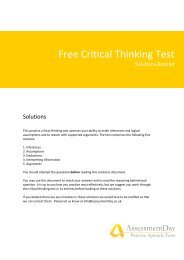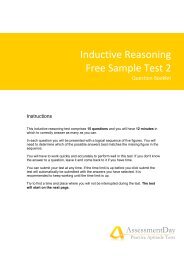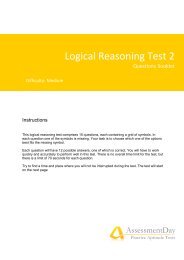Verbal Reasoning Test 1 Solutions (PDF) - Aptitude Test
Verbal Reasoning Test 1 Solutions (PDF) - Aptitude Test
Verbal Reasoning Test 1 Solutions (PDF) - Aptitude Test
Create successful ePaper yourself
Turn your PDF publications into a flip-book with our unique Google optimized e-Paper software.
Stem cells are cells that can self-renew and differentiate into specialised cell types.<br />
Because of their potential to replace diseased or defective human tissue, stem<br />
cells are seen by scientists as key to developing new therapies for a wide range of<br />
conditions, including degenerative illnesses and genetic diseases. Treatments<br />
based on adult stem cells – from sources such as umbilical cord blood – have<br />
been successfully developed, but what makes stem cell research controversial is<br />
the use of embryonic stem cells. Not only do embryonic stem cells reproduce more<br />
quickly than adult stem cells, they also have wider differentiation potential. The<br />
main opponents to stem cell research are pro-life supporters, who believe that<br />
human life should not be destroyed for science. Advocates of stem cell research<br />
counter this crucial point by saying that an embryo cannot be viewed as a human<br />
life, and that medical advances justify the destruction of embryos. Furthermore,<br />
stem cell research utilises the thousands of surplus embryos created for in vitro<br />
fertilisation treatment. The issue is particularly divisive in the United States, where<br />
federal funding is not available for the creation of new embryonic stem cell lines,<br />
although recent legislation has opened up government funding to further research<br />
on embryonic stem cells created through private funding. Whereas many<br />
governments prohibit the production of embryonic stem cells, it is allowed in<br />
countries including the UK, Sweden and the Netherlands.<br />
Q26. Stem cells are at the forefront of medical research because of their ability to<br />
grow indefinitely.<br />
True False Cannot say<br />
Cannot Say – The passage does not tell us if stem cells can grow "indefinitely". Also, the<br />
second sentence tells us that stem cells are seen as "key to developing new therapies". It<br />
would be a stretch to interpret this as meaning they are at the forefront of medical research,<br />
especially as we are not told about their significance compared with other areas of research.<br />
Q27. The United States government does not supply funding for projects using<br />
embryonic stem cell lines.<br />
True False Cannot say<br />
False – The 8th sentence states that federal funding is now available for further research<br />
into stem cells lines that have been created using private funding.<br />
You may share this document with others as long<br />
as you credit AssessmentDay.co.uk with a website<br />
link but you can’t change this document in any<br />
way or use its contents commercially.<br />
Page 12<br />
AssessmentDay<br />
www.assessmentday.co.uk<br />
Document last updated 05-07-2013

















